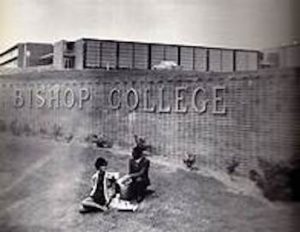
*The beginning of Bishop College is celebrated on this date in 1881. This was a Historically Black College and University (HBCU).
Founded in Marshall, Texas, by the Baptist Home Mission Society, it was intended to serve Black students in east Texas, where most of the Black population lived. Nathan Bishop, the superintendent of several major school systems in New England, started this effort. (then) Baylor University President Rufus C. Burleson secured a pledge of $25,000 from Judge Bishop to start the college during the National Baptist Education Society meeting in Philadelphia, Pennsylvania.
A committee of Baptist ministers from East Texas, where most African Americans then lived, selected a location in Marshall on land belonging to the Holcomb Plantation. For the college's first several decades, Bishop's faculty and administration were staffed largely by whites. The first Black-appointed president was Joseph J. Rhoads, who started in 1929 and served through the Great Depression and World War II.
During his presidency, Bishop phased out the high school preparatory programs associated with the college, which had operated to help students compensate for failures in public education. He emphasized the college's new two-year ministerial program. During the 1930s and 1940s, the ministerial program was developed as the Lacy Kirk Williams Institute. It moved to Dallas when the college moved in 1961. The Lacy Kirk Williams Institute evolved into a week-long seminar that attracted well-known preachers, including Jesse Jackson and Martin Luther King, Sr., in 1975.
In 1961, after receiving a grant from the Hoblitzelle Foundation, Bishop moved to a 360-acre campus in Dallas. It was able to attract more students there. In Dallas, enrollments increased, peaking at almost 2,000 students around 1970. The college closed in 1988 after a financial scandal led to the revocation of its accreditation and its eligibility to receive funds from charities such as the United Negro College Fund. Purchased in 1990 by Comer S. Cottrell, the campus is now used by Paul Quinn College.
In 2006, the president of Georgetown College, Kentucky, proposed a plan to Bishop College alumni to make Georgetown their adopted alma mater. Georgetown offers scholarships to children or grandchildren of Bishop alumni or students nominated by Bishop alumni. Upon graduation, these students receive diplomas with the name and insignia of Bishop College. Georgetown president William H. Crouch Jr. hopes the program will help the college reach its goal of increasing minority enrollment to 25% by 2012.
Black American Colleges and Universities:
Profiles of Two-Year, Four-Year, & Professional Schools
by Levin Hill, Pub., Gale Group, 1994
ISBN: 0-02-864984-2